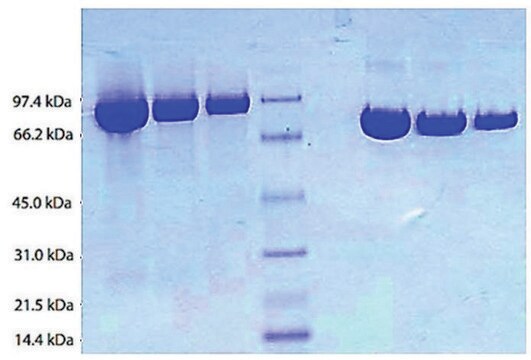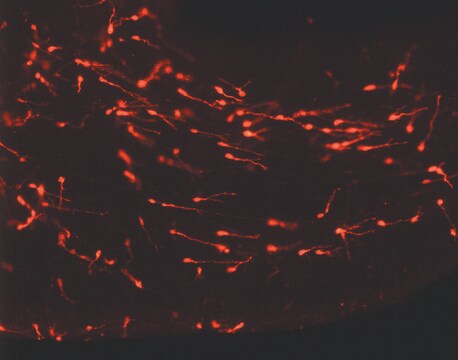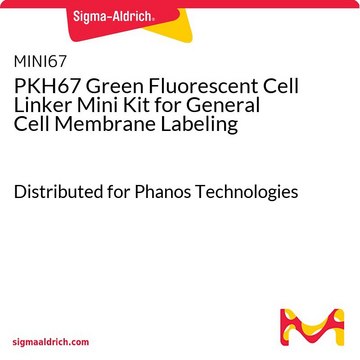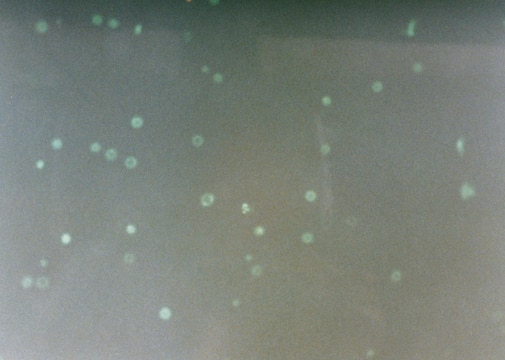T2943
Tissue plasminogen activator chromogenic substrate
≥95% (HPLC), solid
Synonym(e):
TPA Activity Assay
Anmeldenzur Ansicht organisationsspezifischer und vertraglich vereinbarter Preise
Alle Fotos(1)
About This Item
Empfohlene Produkte
Qualitätsniveau
Assay
≥95% (HPLC)
Form
solid
Mol-Gew.
apparent mol wt 658.9
Löslichkeit
methanol: water (1:9): 25 mg/mL
Lagertemp.
2-8°C
Allgemeine Beschreibung
Tissue plasminogen activator chromogenic substrate is a highly sensitive chromogenic peptide substrate for tissue plasminogen activator (tPA). It shows different sensitivity to native single-chain tPA (sc-tPA) and its fully active two-chain form (tc-tPA).
Anwendung
Tissue plasminogen activator chromogenic substrate has been used:
- in tissue plasminogen activator inhibition assay
- to determine the plasminogen activator (PA) activity by studying the glycosylation properties of tissue plasminogen activator (tPA) activities in effusions using concanavalin A-Sepharose (conA-S) chromatography
- in inhibition assays and complex formation analyses of wild type (WT) neuroserpin (NS) and its variants
Lagerklassenschlüssel
11 - Combustible Solids
WGK
WGK 3
Flammpunkt (°F)
Not applicable
Flammpunkt (°C)
Not applicable
Persönliche Schutzausrüstung
Eyeshields, Gloves, type N95 (US)
Analysenzertifikate (COA)
Suchen Sie nach Analysenzertifikate (COA), indem Sie die Lot-/Chargennummer des Produkts eingeben. Lot- und Chargennummern sind auf dem Produktetikett hinter den Wörtern ‘Lot’ oder ‘Batch’ (Lot oder Charge) zu finden.
Besitzen Sie dieses Produkt bereits?
In der Dokumentenbibliothek finden Sie die Dokumentation zu den Produkten, die Sie kürzlich erworben haben.
Mahdieh Bayat et al.
Journal of biotechnology, 280, 1-10 (2018-05-29)
The aim of the present study was to investigate the effect of three routine drug excipients, as osmolytes, in three different concentrations, on structure, thermal stability and the activity of single-chain (sc-) tenecteplase. To see the influence of trehalose, mannitol
Mohammad Farhan Ali et al.
Scientific reports, 7, 42987-42987 (2017-02-24)
Neuroserpin (NS) mediated inhibition of tissue-type plasminogen activator (tPA) is important for brain development, synapse formation and memory. Aberrations in helix F and β-sheet A movement during inhibition can directly lead to epilepsy or dementia. Conserved W154 residue in a
Jesse Cahill et al.
Frontiers in molecular biosciences, 7, 574477-574477 (2020-10-08)
Although chemically inert, Xe and other noble gases have been shown to have functional effects on biological systems. For example, Xe is a powerful anesthetic with neuroprotective properties. Recent reports have claimed that Xe inhibits the activity of tissue plasminogen
Mahdieh Bayat et al.
International journal of biological macromolecules, 130, 863-877 (2019-03-09)
Organic osmolytes, as major cellular compounds, cause protein stabilization in the native form. In the present study, the possible chaperone effects of the three naturally occurring osmolytes on the two-chain form of tenecteplase (tc-TNK), a recombinant, genetically engineered mutant tissue
Deepa Gautam et al.
Frontiers in cell and developmental biology, 10, 834016-834016 (2022-04-08)
Prion peptide (PrP) misfolds to infectious scrapie isoform, the β pleat-rich insoluble fibrils responsible for neurodegeneration and fatal conformational diseases in humans. The amino acid sequence 106-126 from prion proteins, PrP(106-126), is highly amyloidogenic and implicated in prion-induced pathologies. Here
Unser Team von Wissenschaftlern verfügt über Erfahrung in allen Forschungsbereichen einschließlich Life Science, Materialwissenschaften, chemischer Synthese, Chromatographie, Analytik und vielen mehr..
Setzen Sie sich mit dem technischen Dienst in Verbindung.







